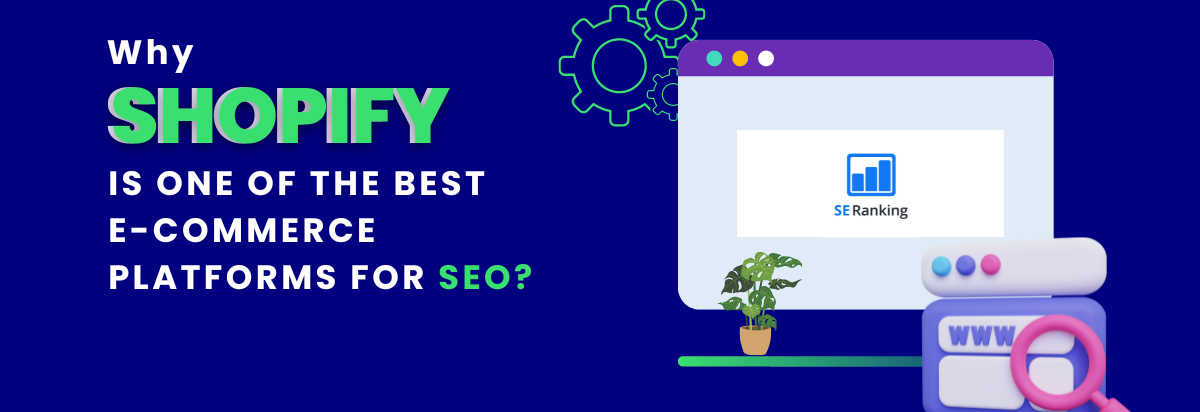E-commerce businesses can greatly benefit from implementing SEO best practices — SEO can increase organic traffic to your website, and give you a higher ROI and a stream of customers. But a large part of SEO depends on your website structure and code, and it’s not like the average e-commerce business owner can improve that on their own.
So the most rational thing to do is pick a platform that’s great for SEO. Out of all e-commerce platforms, Shopify is among the most popular and useful for SEO.
Let’s explore why SEO is an important factor to consider when choosing an e-commerce platform and why Shopify is a decent choice.
What is SEO
Search engine optimization, or SEO, is the process of improving your website to be more in line with search engine guidelines. Most SEO efforts are focused on Google, so it’s those search engine guidelines they’re going to be following.
SEO is divided into two parts: on-page and off-page.
- Off-page optimization: improving your website’s online presence — building links and mentions, starting and participating in conversations around your brand. This builds authority in Google’s eyes and helps with ranking higher on SERPs.
- On-page optimization: even if your site has backlinks, it may fail to rank high if not created with Google’s best practices in mind.
Some parts you can control, like keyword research. With almost any site, whether hosted on Shopify or not, you can find keywords to match your products and include them on the website’s pages.
But technical aspects like website code, hosting, crawlability are often out of reach for business owners. 👉 That’s why the choice of platform is crucial, as it strongly influences SEO.
Why is SEO Important for E-commerce
Many e-commerce businesses get traffic from social media or paid ads. But on average, around a third of traffic comes from organic search.
- Some studies place it at 24%–38%, depending on the industry.
- Paid traffic usually accounts for less than 30%, so focusing on organic is a long-term strategy.
Source: Datareportal
According to a joint Hootsuite & We Are Social study, search engines are the top source of brand discovery and research. That means SEO covers multiple stages of the sales funnel.
Choosing a good platform won’t guarantee top rankings, but it provides the foundation for future SEO.
Benefits of using Shopify for SEO
Shopify is a solid choice for SEO. Here are 4 key benefits:
Benefit 1: Shopify is search engine friendly
Shopify was designed with SEO in mind. It provides tools for what you can optimize yourself and handles what you can’t.
Things you can’t change (Shopify handles):
- Hosting: fast & secure, included in your plan.
- CDN (Content Delivery Network): global servers for faster access worldwide.
- Caching: built-in caching for faster page loads.
Things you can change:
- Add/edit title, meta description, page URL.
- Add/edit alt text for images.
- Edit robots.txt to block pages from indexing.
- Shopify auto-generates a sitemap for search engines.
- Tools like Online store speed report help track SEO health.
➡️ With basic keyword research and optimization, even a simple Shopify page can rank decently.
⚠️ Potential issues:
- Third-party apps
- Custom Liquid code
- Large unoptimized images
👉 Always test updates with an SEO audit tool like SE Ranking Website Audit.
Source: SE Ranking
You can follow most recommendations yourself to optimize store speed. Issues with JavaScript or CSS usually come from themes or apps — check for updates if they slow down performance.
Benefit 2: Shopify is easy to use.
As you see, Shopify has plenty of features that help with building a good SEO basis for your e-commerce store. Luckily, they don’t come with a skill requirement.
The basic SEO tasks of adding tags to each page can be made in a page builder. In fact, these two tags are the first thing you see on the editing page, so you won’t have a chance to miss them.
You can also scroll down to the bottom of the editing page to see how your page would look on the SERP and make adjustments to the title or meta description tag as well as customize the URL.
Source: Shopify
You don’t have to be an SEO expert to manage the basic tasks. And the platform gives you a hand by putting these tags front and center of the editing page.
Benefit 3: Shopify is scalable.
Once your store starts growing, Shopify won’t constrain your SEO efforts. The biggest impact it has which you’ll come to appreciate is the hosting it provides.
You may not feel the impact, but it’s there — its internal server infrastructure and CDN make loading speed faster for clients all around the globe.
The average server response time for Shopify sites is around 380 milliseconds. That is not perfect; the response time a custom-made site should strive for is 200 ms. But considering the fact you don’t have to invest tens of thousands of dollars, even this average response time is more than adequate.
Shopify hosting also doesn’t have restrictions on bandwidth — this means your site can be visited by thousands of people at once, and it won’t struggle with loading.
If you want to scale your SEO efforts, Shopify’s app store has over 600 powerful SEO-related apps you can use with your store.
Source: Shopify
However, you might want to opt for a separate SEO tool like SE Ranking if you’re really serious about SEO. It gives you a deeper understanding of the internal SEO processes of your site and lets you do competitive research to start building on off-page optimization.
Benefit 4: Shopify has a large community.
If you’re not ready to dive deeper into SEO and are not even sure where to start, Shopify can still be a good platform for you.
If you’re lost in any particular thing, you can go to the Shopify community hub and ask a question there. The platform has an amazingly large community of experts who will be eager to provide exhaustive explanations to any beginner questions.
In fact, there are more than four thousand SEO-related questions already answered on the Shopify forum, so the odds are you can find a solution by simply searching through it.
Learn more: How to Start a Shopify Store – Full Setup & Launch Guide
Conclusion
All in all, Shopify is a pretty good e-commerce platform when it comes to SEO. It has a good backend that you don’t have to worry about, an intuitive editor that makes it easy to do basic SEO tasks, and Shopify is scalable.
It won’t fail you, and can even serve as a good start to your SEO journey if you are just starting out.
But if you were thinking of switching from Magento to Shopify to improve your SEO, don’t. There’s a great Magento SEO extension that can turn this e-commerce platform into your SEO powerhouse.


